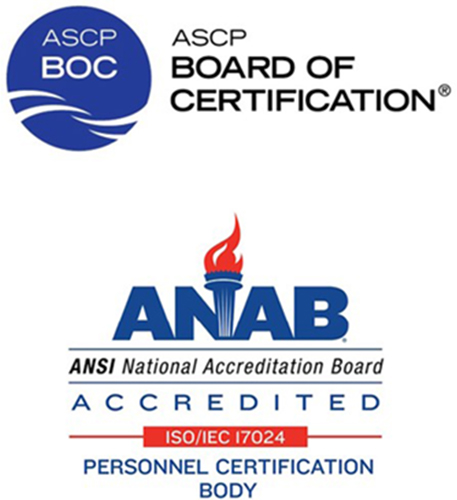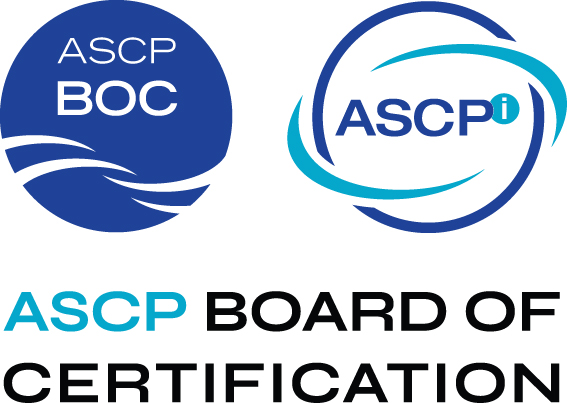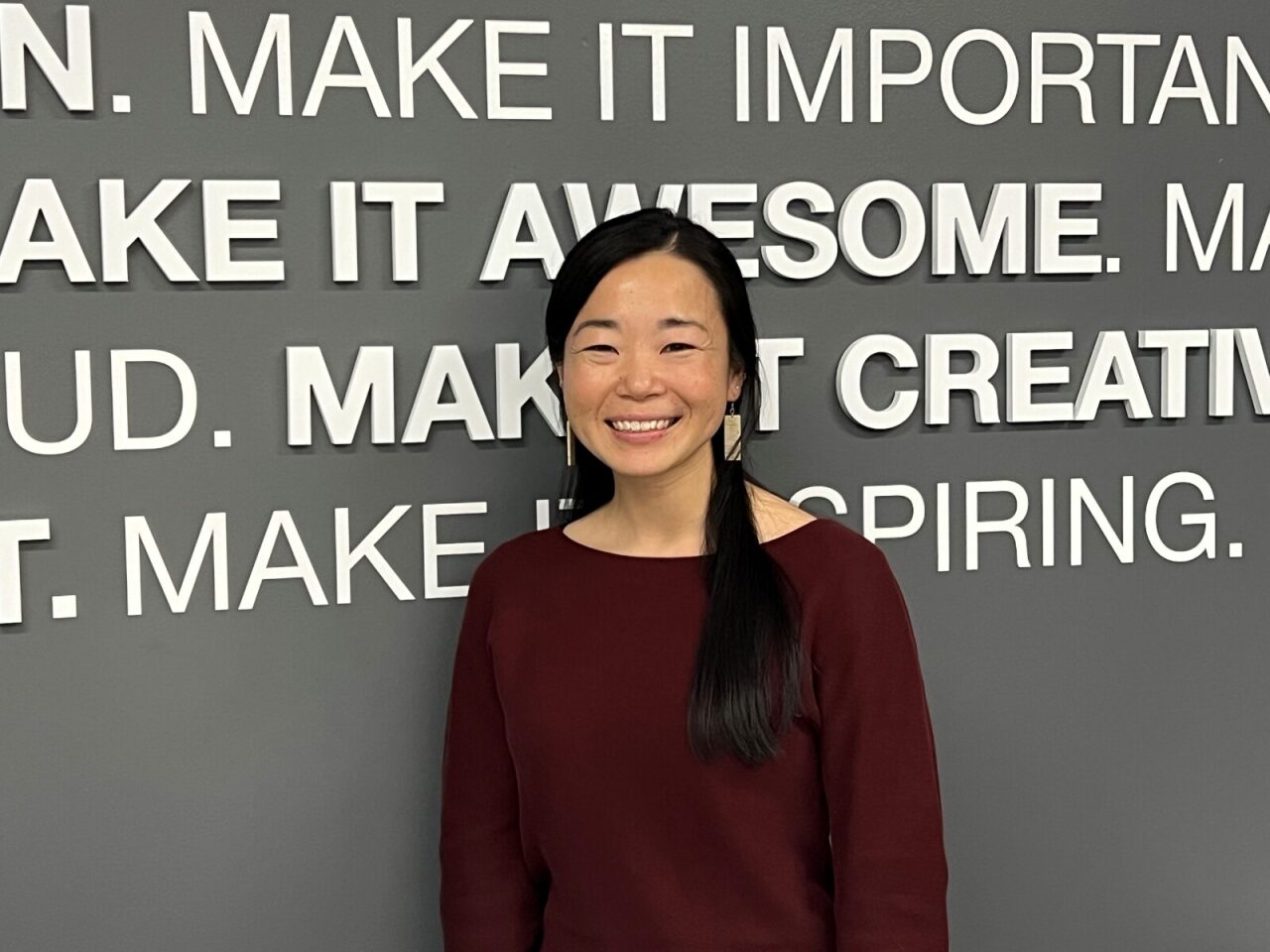Obtain certification and advance your career in medical laboratory science with our specialized credential.
Conducts a full range of laboratory tests, from routine to complex, in blood banking, chemistry, hematology, immunology, microbiology, molecular biology, and/or urinalysis on biologic specimens to provide information necessary for the diagnosis and treatment of disease. Problem solves issues with specimens, testing, and instrumentation. Evaluates, develops, and validates diagnostic testing and instrumentation.
Attaining an American Society for Clinical Pathology Board of Certification (ASCP BOC) credential requires a laboratory professional or other expert to meet specific education, training, and/or experience standards and to successfully pass an examination demonstrating knowledge and applied skills. The ASCP BOC offers ASCP and ASCPi credentials based on distinct eligibility requirements. All candidates must carefully compare credentialing options. Additional information is available about the similarities and differences between ASCP and ASCPi credentials.
Each credential has specific eligibility requirements, which are different for ASCP and ASCPi. It’s your responsibility to confirm that your education, training, and/or experience meet the criteria. Submit the correct documentation with your application. Once submitted, the category and route of application cannot be changed.
Check Your EligibilityAn applicant must be able to verify that they meet all eligibility requirements, including education, training, and/or experience. For complete information, see the Documentation section of the website.
Education does not need to be from the United States. Details are available by reviewing the webpage titled Acceptable Education, also available in the routes below.
To be eligible for this examination category, an applicant must satisfy the minimum requirements (for degrees, the stated degree or higher) of at least one of the following routes:
An applicant must be able to verify that they meet all eligibility requirements, including education, training, and/or experience. For complete information, see the Documentation section of the website.
Education needs to be equivalent to education from the United States. Details are available by reviewing the webpage titled Acceptable Education, also available in the routes below.
To be eligible for this examination category, an applicant must satisfy the minimum requirements (for degrees, the stated degree or higher) of at least one of the following routes:


*Acceptable Clinical Laboratory:
CMS CLIA certificate of registration, compliance, accreditation;
OR DoD CLIP certificate of registration, compliance, accreditation;
OR JCI accreditation;
OR Accreditation under ISO 15189.
^Successful completion of a NAACLS-accredited MLS program, NAACLS or ABHES-accredited MLT program, or a foreign medical laboratory science clinical training program within the last 5 years can be used in lieu of 1 year of full-time acceptable clinical experience. In addition, this will count as completion of 1 semester of organic or biochemistry and must be documented on this Program Completion Documentation Form.
*Acceptable Clinical Laboratory:
CMS CLIA certificate of registration, compliance, accreditation;
OR DoD CLIP certificate of registration, compliance, accreditation;
OR JCI accreditation;
OR Accreditation under ISO 15189.
^Successful completion of a NAACLS-accredited MLS program, NAACLS or ABHES-accredited MLT program, or a foreign medical laboratory science clinical training program within the last 5 years can be used in lieu of 1 year of full-time acceptable clinical experience. In addition, this will count as completion of 1 semester of organic or biochemistry and must be documented on this Program Completion Documentation Form.
It will not be required for MLS(ASCPi) certificants to retake the certification exam.
If a course-by-course transcript evaluation from an acceptable evaluation agency
was submitted with your original MLS(ASCPi) application you do not need to re-submit it unless specifically requested by the ASCP BOC office.
Once transitioned from MLS(ASCPi) to MLS(ASCP) there will not be an option to revert back to MLS(ASCPi). Previous MLS(ASCPi) certification will not be able to be used to meet the eligibility requirements for additional certifications. Moving forward, your MLS(ASCP) certification will be used to meet the eligibility requirements for additional U.S. certifications.
This transition does not circumvent federal work and state licensure regulations and individuals seeking employment in the U.S. will still need to meet all the U.S. immigration visa requirements.
*Acceptable Clinical Laboratory:
CMS CLIA certificate of registration, compliance, accreditation;
OR DoD CLIP certificate of registration, compliance, accreditation;
OR JCI accreditation;
OR Accreditation under ISO 15189.
*Acceptable Clinical Laboratory:
CMS CLIA certificate of registration, compliance, accreditation;
OR DoD CLIP certificate of registration, compliance, accreditation;
OR JCI accreditation;
OR Accreditation under ISO 15189.
#Official documentation of your military code (NEC, MOS, AFSC code or 68K), official certificate verifying completion of training, or an official copy of your DD214 form, SRB, or ERB must be uploaded in PDF format as part of completing the online application.
Baccalaureate degree from an accredited/approved* educational institution educational institution in Medical Laboratory Science$, biological science, or chemistry,
AND successful completion of a Medical Medical Laboratory Science training program* Science training program*. The training program must include blood banking (immunohematology), chemistry, hematology, and microbiology and must be documented on this Training Documentation Form.
Graduates of previously recognized international medical laboratory science programs may not be required to submit a transcript evaluation. Please consult with your program director about current submission requirements.
*Accredited/approved by a governing regulatory association or Ministry. Countries without a prevalent system of accreditation/approval must have programs/educational institutions approved by an International Advisory Board appointed by the ASCP Board of Certification, or eligibility will be determined by an acceptable transcript evaluation. The foreign degree must be equivalent to a U.S. degree.
$Degrees/Diplomas in Medical Laboratory Science include Medical Laboratory Science, Medical Technology, Clinical Laboratory Science, and Biomedical Laboratory Science.
Baccalaureate degree from an accredited/approved* educational institution in Medical Laboratory Science$,
AND 3 years of acceptable clinical# experience in an accredited/approved laboratory. Experience must include blood banking (immunohematology), chemistry, hematology, and microbiology and must be documented on this Experience Documentation Form.
An applicant must have experience in all required areas; however, they do not need to have 3 full years of experience in each area.
*Accredited/approved by a governing regulatory association or Ministry. Countries without a prevalent system of accreditation/approval must have programs/educational institutions approved by an International Advisory Board appointed by the ASCP Board of Certification, or eligibility will be determined by an acceptable transcript evaluation. The foreign degree must be equivalent to a U.S. degree.
$Degrees/Diplomas in Medical Laboratory Science include Medical Laboratory Science, Medical Technology, Clinical Laboratory Science, and Biomedical Laboratory Science.
#Clinical laboratory accredited by JCI, CAP, under ISO 15189 or authorized by a governing regulatory association or Ministry. Countries without a prevalent system of accreditation must have laboratories approved by an International Advisory Board appointed by the ASCP Board of Certification.
Baccalaureate degree from an accredited/approved* educational institution,
AND successful completion of a 2-year Medical Laboratory Science program*. The training program must include blood banking (immunohematology), chemistry, hematology, and microbiology and must be documented on this Training Documentation Form.
*Accredited/approved by a governing regulatory association or Ministry. Countries without a prevalent system of accreditation/approval must have programs/educational institutions approved by an International Advisory Board appointed by the ASCP Board of Certification, or eligibility will be determined by an acceptable transcript evaluation. The foreign degree must be equivalent to a U.S. degree.
Baccalaureate degree from an accredited/approved* educational institution in biological science or chemistry,
AND 5 years of acceptable clinical# experience in an accredited/approved laboratory. Experience must include blood banking (immunohematology), chemistry, hematology, and microbiology and must be documented on this Experience Documentation Form.
An applicant must have experience in all required areas; however, they do not need to have 5 full years of experience in each area.
*Accredited/approved by a governing regulatory association or Ministry. Countries without a prevalent system of accreditation/approval must have programs/educational institutions approved by an International Advisory Board appointed by the ASCP Board of Certification, or eligibility will be determined by an acceptable transcript evaluation. The foreign degree must be equivalent to a U.S. degree.
#Clinical laboratory accredited by JCI, CAP, under ISO 15189 or authorized by a governing regulatory association or Ministry. Countries without a prevalent system of accreditation must have laboratories approved by an International Advisory Board appointed by the ASCP Board of Certification.
Baccalaureate degree from an accredited/approved* educational institution,
AND a 2-year diploma from an accredited/approved* educational institution in biological science or chemistry,
AND 5 years of acceptable clinical# experience in an accredited/approved laboratory. Experience must include blood banking (immunohematology), chemistry, hematology, and microbiology and must be documented on this Experience Documentation Form.
An applicant must have experience in all required areas; however, they do not need to have 5 full years of experience in each area.
*Accredited/approved by a governing regulatory association or Ministry. Countries without a prevalent system of accreditation/approval must have programs/educational institutions approved by an International Advisory Board appointed by the ASCP Board of Certification, or eligibility will be determined by an acceptable transcript evaluation. The foreign degree must be equivalent to a U.S. degree.
#Clinical laboratory accredited by JCI, CAP, under ISO 15189 or authorized by a governing regulatory association or Ministry. Countries without a prevalent system of accreditation must have laboratories approved by an International Advisory Board appointed by the ASCP Board of Certification.
Reduced pricing is available for those educated and residing in low-to-middle income countries.
You must upload the appropriate documentation form when you apply online, verifying that you meet the training and/or experience requirements for your category and route of application. You will also need to submit an acceptable transcript or transcript evaluation verifying that you meet the academic requirements. Gather your documents before submitting your application and application fee.
Once you have confirmed that you meet the requirements and have gathered your documents, submit your online application.
 |  |
In early 2026, the ASCP BOC will launch digital badging through Credly, a trusted provider that increases the visibility of ASCP BOC credential holders by securely showcasing and sharing professional credentials. Learn more about digital badges.
